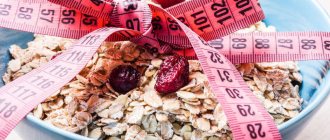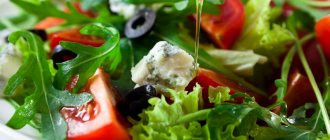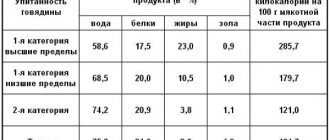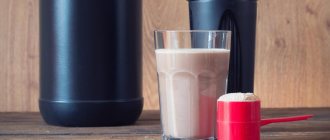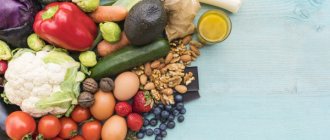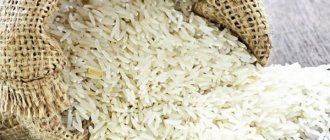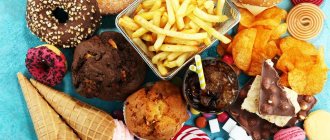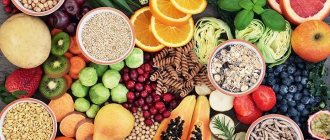Is it true that large amounts of carbohydrates consumed during the day can be stored as fat?
This point of view exists and is very widespread.
Many people notice that even when consuming a small amount of fat, replacing them with a significant amount of carbohydrates, they not only cannot lose weight and burn fat reserves, often the arrow on the scale even creeps up.
Let's try to understand why this happens, what is the mechanism for increasing body weight when replacing fats in the diet with carbohydrates, and whether the latter can really be deposited on our sides.
Chemistry of the process
As you know, if our diet contains a significant proportion of fat, and physical activity is insufficient to burn it, it is deposited in the form of fat under the skin, as well as on organs.
At the same time, carbohydrates can also be stored by the body. They are stored primarily in the form of glycogen, which is sometimes called “animal starch” due to the similarity in the structure of the molecule.
So can carbohydrates be converted to fat instead of becoming glycogen?
Research conducted by the Swiss University of Lausanne shows that they still can, but under certain conditions and in very small quantities.
According to the data obtained, to start this process, two conditions must be met:
- fat in the diet should not be more than 10%;
- the proportion of carbohydrates should be very significant - a figure that would more than cover a person’s daily energy needs.
Research also mentions that the energy efficiency of this process is very low: to convert carbohydrates into fat, the body needs to spend a large number of calories. In other words, you won’t get a lot of fat from carbohydrates!
How food turns into fat: no, carbohydrates and sugar do not go into fat - 6 myths
Have you ever thought about how we get fat?
Well, that is, it’s clear - eat a lot, wider your waist. But how does the body convert food into fat? People are much less interested in this process than in the opposite process - the breakdown of fat, and in vain - because without understanding the other side of the coin, it is difficult to get it.
We decided to talk about this amazing transformation in simple, understandable words and give a couple of important tips that will help you better understand your body and make it easier (yes, we veiled the word “lose weight”).
This article will be especially helpful for those who believe that specific macronutrients (such as fat or carbohydrates), foods, and meals are to blame for their weight gain.
So, let's go.
The first thing that is important and needs to be accepted: any macronutrients in large quantities contribute to fat gain . Yes, even protein, if you eat more of it than you need, i.e. Get more calories in a certain period of time than you can spend on energy needs.
The key to storing fat is not what you eat, but how much. Many continue to stubbornly not believe in this, citing some arguments about the glycemic index or insulin. We would like to once again remind you of the important points (briefly):
- The glycemic index does not affect weight loss, it only affects blood sugar levels. If you eat a product with a high GI, this only means that after eating it, your blood sugar level will rise faster than if you eat equal portions of other carbohydrate foods.
This does not mean that all the calories from it will inevitably go to fat, it only means what is written above. Only those people who have problems with this, such as diabetes, insulin resistance, etc., need to monitor their GI.
- Insulin is not the “fat gain hormone,” as it has been dubbed on the Internet. Insulin resistance is based on a) physical inactivity (little amount of movement in life, which, by the way, more dangerous than smoking), b) stable overeating, c) heredity.
As you can see, both factors depend only on you. We ourselves create a vicious circle for the body: we eat a lot of food, the body releases a lot of insulin. A lot of insulin + low activity = low responsiveness of cells to it. Low cell responsiveness to it = high insulin resistance. High insulin resistance = diabetes and other troubles.
We discussed the whole process in detail in the article about insulin , don’t be lazy to study it.
- Protein is not directly stored in fat, but it makes you fatter. If you eat a lot of protein (it is generally accepted that by “a lot of protein” they mean more than 2 grams of protein for every kg of body), you will spend less fat and carbohydrates.
Here we will quote Lyle MacDonald, known to everyone who loses weight and exercises, he clearly explained these processes:
“The protein will not be converted into fat and stored. But if you eat a lot of protein, the body will use it for energy (rather than carbs and fats). Which means other nutrients will go into reserves.
Which means that overeating protein will make you fat, just not directly, but due to the fact that all the fat you eat goes under the skin.
Of course, protein has the highest thermic effect; more incoming calories will be used to digest food. So too much protein is less likely to make you fat anyway, but if the balance is exceeded, you will get fatter.
But not through direct conversion of protein into fat, but through a decrease in the number of other nutrients burned.
- Sugar doesn't go straight into fat. A lot of people (you can’t even imagine how many people believe this) think that if you eat sugar, you’ll never lose weight, no matter what.
Of course, otherwise it would be very sweet (yes, irony) and simple: well, just don’t eat this and you are guaranteed to lose weight. But is that really what happens? Scientists asked themselves this question and conducted a 6-week study of 2 low-calorie diets.
The first diet consisted of sugars at 43% of total calories. The second is only 4%. There were no significant differences in body weight or subcutaneous fat loss between the two diets .
Everything again comes down to the notorious calories, so let them go!
- Carbohydrates also do not go directly to fat.. And again, Lyle's quote:
An excess of carbohydrates still affects your fat reserves, preventing you from burning the fat you eat during the day. This is why exceeding your daily caloric intake by 500 calories of fat or 500 calories of carbohydrates makes you fat, they just do it for different reasons and in different ways.
An additional 500 calories of fat are simply deposited under the skin, 500 calories of carbohydrates make it so that all the fat eaten during the day will go into reserves, because carbohydrates will be oxidized, not fats.
- However all of the above does not mean that any fat eaten goes into fat. More precisely, not quite so: every day, all dietary fat is deposited in fat cells after eating - it does not remain floating in the blood and is not burned immediately after eating.
But if you are on a diet, then fat is taken from reserves to provide the body with the missing energy. But an excess of dietary fat is directly stored in reserves.
We need to eat fat, we really, really need it for the production of cholesterol , bile, cell membranes, etc.
So, imagine you ate something tasty and healthy. What will happen in your body after this? The teeth thoroughly grind the food, and saliva moistens it - this is necessary for convenient passage through the gastrointestinal tract and further breakdown.
Saliva, by the way, contains enzymes (enzymes) that break down complex food components into simpler ones. Next, the bolus of food is sent to the stomach, which begins to contract in order to grind the food even more and mix it with gastric juice.
Pepsin, an enzyme that breaks down proteins into molecules that consist of two or more amino acids - peptides, and hydrochloric acid help break down food, turning it into a liquid or semi-liquid substance called chyme.
It enters the initial part of the small intestine or the so-called duodenum (the place where the gallbladder secretes bile). In order for fats to be more easily absorbed by the body, bile dissolves them in water.
Enzymes from the pancreas enter the duodenum and then break down sugars, fats and proteins. Now that everything has dissolved and is in liquid form, absorption occurs through the mucous membrane of the small intestine.
After all, all nutrients are distributed throughout the body. What happens to former carbohydrates?
So, the resulting glucose enters the bloodstream, from where it goes either to glycogen (in the liver and muscles), or to the necessary needs of the body.
Fat also goes into the bloodstream, but then goes to the liver. Not all lipids are absorbed by the body; for example, fats from peanuts are not absorbed. The liver uses some fats to synthesize other important substances (such as cholesterol), and sends the rest to fat cells, where they remain until needed.
Proteins break down first into peptides, then into simple amino acids, which are absorbed through the mucous membrane of the small intestine and enter the bloodstream. From here, some stored amino acids are used for the construction of various tissues necessary for the body.
It is quite difficult to achieve an excess of protein in the body (protein reserves in the body are about 10-15 kg, and even if you eat 200-300 grams per day, this is much less than what the body can store) and in any case, there will be no protein processed into fat and stored.
“Excess” protein is not excreted from the body and does not rot in the kidneys, it’s all nonsense. The body simply begins to use protein as energy, and other nutrients (fat and carbon) will go into reserves.
The important point that you need to take away from all this for your successful and wonderful weight loss:
- If you eat more calories, no matter which macronutrients, than you need, you will gain weight.
- If you eat a lot of carbs and little fat, you will burn a lot of carbs and little fat. Better eat less carbohydrates (40-60% of your diet) and you will burn less carbohydrates and more fat.
- A lot of protein does not equal weight loss. If you eat a lot of protein, you burn a lot of protein and little fat and carbohydrates); eat less protein and you'll burn less protein (and therefore more carbs and fat).
- Fat is deposited and consumed every day, regardless of the caloric content of the diet, this is a constant. We only get fat if we store more fat than we burn. We lose weight if the body uses more fat than it has time to store. And this is determined by the overall calorie deficit during the day.
An important point: if you do not eat fats, then carbohydrates turn into fat through de novo lipogenesis. This occurs when calories from fat fall below 10% of your total daily calorie intake. For example, when on a 2500 diet we eat less than 250 calories from fat (less than 27 grams of fat).
In short, you will not deceive weight loss and your body. You need to eat all your macronutrients, distributing them so that you end up with a calorie deficit of 10-20%. Absorbing one of the macronutrients (protein, fat or carbohydrates) will not give you extra points.
If a person eats more than his norm, he gets fat, regardless of cheating with macronutrients. We very, very strongly recommend that you read the book “ Dietary Nonsense ,” which will help you get rid of the false myths that poison your life.
View the book
What is the point of observing all these stupid but strict restrictions, doing what you don’t want, if it doesn’t work and this has been proven a long time ago ?! After all, losing weight is very easy - you just need to listen to yourself, know how the body works, eat right and exercise for your pleasure.
But everything unnatural - carbohydrate-free diets, protein meal replacements, fasting - these are typical dietary nonsense, which usually lead to serious disorders in the body, including anorexia, bulimia, colitis, gastritis, etc. And it’s not at all possible to lose weight help.
- What fruits can you eat while losing weight?
- 5 reasons to eat before bed on a diet: no, it will NOT interfere with weight loss, it’s healthy
- 10 myths about the dangers of sugar: no, it’s not a drug!
[Total votes: 32 Average: 4.4/5]
Bone Wide
This article was reviewed by a certified nutritionist who has a bachelor's degree in nutrition and dietetics, D. G. Veremeev.
Articles are for informational and educational purposes only and are not a substitute for professional medical advice, diagnosis, or treatment. Always consult your physician with any questions you may have about a medical condition.
Why do we get fat from carbohydrates?
A logical question, the answer to which, in fact, lies on the surface.
When there is an excess of carbohydrates in the diet, they begin to be stored in the form of glycogen, forming a reserve for further consumption during a calorie deficit.
And, as you know, carbohydrates can not only be stored on their own, they also bind water - for each unit of carbohydrate there is three times more water stored with it.
In addition, increasing the percentage of carbohydrates in the diet forces the body to burn them first, without touching fat reserves that have already been deposited. It is simply easier for our body to obtain energy from sugars than from fat, which is much more difficult to convert into energy.
Thus, an increase in body weight due to excessive consumption of carbohydrates at the expense of fats has two reasons: glycogen deposition (mainly in liver and muscle cells), and preventing the burning of accumulated fat reserves.
It is worth noting that a similar story occurs with increased protein consumption - the body begins to draw energy from it, leaving lipid potential intact.
What's worse - salt or sugar?
Another myth of proper nutrition is that excess salt in the diet definitely leads to the development of hypertension. But in real life, it all depends on the amount of sugar (and carbohydrates in general) consumed, as well as on the level of physical activity.
At the same time, it is the excess of carbohydrates (against the background of a sedentary lifestyle) that increases fluid retention and, in the long term, provokes the development of hypertension through its effect on insulin production.
// What is more harmful - salt or sugar?
How many carbohydrates can you eat?
Modern recommendations say that the total amount of carbohydrates in the diet should be limited to 150 g of “net” carbohydrates per day. In this case, ultra-processed foods should be completely excluded.
As for sugar, the maximum figure is 10% of the daily calorie intake - about 50 g. It has been proven that regularly exceeding the norm leads to the development of obesity, diabetes and hypertension.
// 150 g of carbohydrates - is it a lot or a little?
***
New Fitseven materials, 5 times a week - in telegram:
- fit7seven
The effect of carbohydrates on excess fat gain is determined by their type and quantity. Consumption of more than 25 g of fructose per day (a glass of juice) and a total of sugars in an amount greater than 10% of calories (a piece of cake) has been proven to lead to the development of obesity, diabetes, hypertension and metabolic syndrome.
Data sources:
- Relation between consumption of sugar-sweetened drinks and childhood obesity: a prospective, observational analysis, source
- High Dietary Fructose: Direct or Indirect Dangerous Factors Disturbing Tissue and Organ Functions, source
Fast and slow carbohydrates
Carbohydrates can be divided into fast and slow. Fast carbohydrates are quickly absorbed and increase the amount of sugar. In addition, they contribute to the release of insulin and convert it into fat. Fast carbohydrates only help during training if you intend to “trigger” fat burning.
What foods should you avoid to avoid storing carbohydrates? First of all, it is sugar and various confectionery products - sweets, cakes, buns, pies, jam, and chocolate, beloved from childhood. Finally, various sweet drinks, and even fruit. It's best to eat small amounts of these foods before your workout so that your body knows which substances to target.
How are carbohydrates stored?
Carbohydrates tend to be deposited even in the body of an athlete. And if a woman stops leading an active lifestyle, and even eats a lot, then reserves appear faster. Due to the fact that the weaker sex does not require much energy for metabolism, and it itself is slow, carbohydrates accumulate and are stored “in reserve” much faster than it happens in men. Since women do not need energy, fat synthesis occurs. The carbohydrate simply transforms into another form, settling on our wasp waist and beautiful hips.
If you do not exercise, then you should significantly reduce the amount of carbohydrates contained in your food. This will help you avoid gaining the desired weight. It is also worth paying a little attention to your figure and physical activity. The body will begin to spend reserves to supply itself with energy, because it is thanks to it that we walk, breathe, and digest food.
If you are a professional athlete, then in this case the situation will be different. You need to strictly follow your diet and the amount of carbohydrates you consume. This will help control excess weight. It's also worth remembering that carbohydrates don't always turn into fat. Sometimes they are just needed for recovery. Most often this can be observed in sports.
Factors that contribute to the deposition of carbohydrates:
- Age—the older a woman is, the slower her metabolism.
Heredity - often the cause of deposits is a genetic predisposition.
Overeating - some women eat a lot of carbohydrates, but the body does not need them.
- Passive lifestyle - when a woman leads a passive lifestyle, moves little, drives a car all the time, the body does not require much energy, which means carbohydrates are stored in bins.
Why then do we get fat on a calorie surplus with little fat?
Nutritionist and fitness expert Lyle McDonald writes the following in his book How We Get Fat:
“Carbohydrates are rarely converted into fat and stored that way. When you eat more carbs, you burn more carbs and less fat; eat fewer carbs and you will burn fewer carbs and more fat. An excess of carbohydrates increases the amount of carbohydrates burned, reducing the amount of fat burned; more of the fat eaten per day is stored in fat reserves.”
When the goal is to reduce the amount of fat, this is done largely by reducing carbohydrates, just so that the body uses the existing fat for life support.
If there are plenty of carbohydrates, it takes energy from them and not only does not touch the already accumulated fat layer, but also stores the fats consumed daily. If carbohydrates are scarce, it uses up reserves.
In this case, giving up fat seems very tempting: however, we must not forget that reducing it too much will lead to both the possibility of DNL and many health problems. (You can read about the benefits of fats in our material “Why eat fats”).
Phobias and radicalism in nutrition: why is fat back in fashion?
Over the past 60 years, the paradigm of our nutrition has undergone significant changes at least twice.
Our parents' generation, and to some extent our generation, went through the era of fatphobia - the fear of fat and the reign of its energy rival - sugar in all forms (carbohydrates).
This era is slowly but surely passing, but the radical nature of the changes is alarming.
Some were seized not even by saccharophobia (largely justified), but by carbohydrate phobia (fear of even whole foods containing starch and glucose).
At the heart of these fears is a metabolic model that places carbohydrates—and their supposedly unique ability to stimulate excess insulin production—as the main enemy in the obesity and diabetes epidemic.
The fear of stimulating the insulin response has extended to protein. In its most radical form, the worship of fat is expressed in nutrition, the basis of which is fats and oils in their pure form - even such healthy ones as olive and ghee.
All for the sake of the desire to protect yourself from the “villain insulin.”
At the same time, such extreme formats often do not solve the problems for which they are often used and for which they are loudly proclaimed as a panacea - insulin resistance and excess weight.
If you follow the popular theory today, then everything would seem simple: cut out sugar, reduce carbohydrates, eat plenty of fat, and in a month or two you’ll be ready for bikini season.
In practice, everything is not so simple. I often encounter women who futilely stuff themselves with oil and lose sleep without starchy carbohydrates. The weight stands still, and, what’s most interesting, often the insulin level does too.
But just like with calorie-restrictive diets, constant breakdowns become part of their life. Breakdowns into the “carbohydrate abyss” from the “peak” called “keto”.
Start your journey to improved well-being and quality of life today - join the free email training “5 Steps to Optimal Blood Sugar Regulation”!
Controversies – how to eat for weight loss?
Meanwhile, many researchers shrug their shoulders looking for correlations between carbohydrate intake and weight gain/loss.
Thus, one of the widely cited recent studies, DIETFITS, surprised the organizers and concluded that a low-fat diet was as effective for weight loss as a low-carb diet after 12 months of adherence.
At the same time, in both groups, the spread of weight loss was surprising for the researchers - more than 36 kg! Among the participants in both groups, the results were radically different - from losing 25 kg to gaining 9 kg!
And the most successful, according to the researchers’ observations, were those to whom their new diet brought satiation and pleasure!
Following such results, slowly but surely for a couple of decades another paradigm has been emerging, in which the relationship between insulin and carbohydrates and fats has changed, and other important players and concepts have appeared (I will talk about them later). And many inexplicable phenomena suddenly fell into place.
Let's look at the very complex relationship between insulin and the two major macronutrients, fat and sugar, and the concept of insulin resistance itself.
conclusions
I hope that I have been able to dispel any doubts among readers about what effect carbohydrates can have on fat gain in healthy people.
What is certain is that although carbohydrates are very reluctant to be converted into fat stores - in order for the DNL pathway to become active, all glycogen stores in the body must first be saturated. This route may be effective in some circumstances. However, for most people, carbohydrate intake will have a much stronger effect on increasing fat levels.
Carbohydrates are the primary fuel used by our body. Thus, if we provide more of them in the diet, the burning of fatty acids is reduced. The more carbohydrates, the stronger the process, which can lead to IMPROVEMENT OF FAT.

